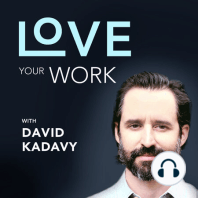36 min listen
107. Build Good Habits: Stanford Behavioral Scientist BJ Fogg
FromLove Your Work
ratings:
Length:
68 minutes
Released:
Jan 4, 2018
Format:
Podcast episode
Description
BJ Fogg (@bjfogg) is a behavioral scientist at Stanford University. He specializes in "Behavior Design," which aims to influence people for the better through insights about human behavior. In this podcast episode, BJ breaks down how to build good habits. Why do we fail to build good habits? Most resolutions to build good habits fail for two reasons: We think too vaguely. We think things like "I want to eat healthier" or "I want to lose weight." If you want to make something a reality you have to break it down into actions. Specificity makes behavior easier to change. Our motivation changes. You might start off trying to build good habits and feel very motivated, but your motivation will wane. You may have felt very motivated by something – such as the New Year – but that will pass. Or, life gets in the way, and that causes your priorities to change. What are some of the hardest good habits to build? What is a good habit? Well, that's up to you. But some of the most common good habits that people want to build are writing, and meditation. Yet they're the hardest. It's up to you what you consider to be a good habit. If you need help deciding on one popular habit: Should you make your bed? I've got you covered with that episode. Since I wrote a book about building writing habits with the aim of writing a book, I'll use that as an example to apply BJ's concepts in this post. The "swarm of bees" approach to build good habits We fail to build good habits because we think to vaguely. For example, we might say we want to write a book. You can't just sit down and write a book, especially if you're a beginning writer. An even more vague goal you might hear from people is that they want to "eat healthy." Neither of these are habits. These are outcomes. They are the results of taking actions, but they aren't actions themselves. So, it becomes mentally impossible to use them to "build good habits," if you aren't intentional about it. Fogg uses a concept, in his tiny habits training program, he calls the "swarm of bees." You start with your vague outcome. Fogg calls it an "aspiration." Write it down on a piece of paper. Then, write down a bunch of behaviors you could do that would help lead to that aspiration. It looks like this slide from Fogg's TEDx talk. [caption id="attachment_4474" align="aligncenter" width="750"] The "swarm of bees" is an outcome surrounded by behaviors that could lead to that outcome.[/caption] In this slide, the aspiration is "health outcomes," which could be something like losing weight. Let's think of the swarm of bees as something like writing a book. Outcome: Write a book Behaviors Sit at computer. Put fingers on keyboard. Type. Read about how to write a book. Read about how to publish a book. Do market research. and so on... Not all behaviors are habits: Three categories of behaviors As you come up with behaviors to match your aspiration, you'll find each behavior falls into one of three categories: One-time behaviors: Things you do just once, such as buy a book or schedule an appointment. Behaviors over a period of time: Things you do over a period of time, such as mow the lawn regularly over the summer. Habits: Things you do habitually with no time restriction. Brushing your teeth, meditating, or writing. Pick behaviors that are a good match for you, to build good habits Now you have an outcome you want to reach, and you have a list of behaviors that will bring you closer to that outcome. Next, you need to pick a behavior that you can build into a good habit. But you don't want to pick just any behavior. If you want to build good habits, the behavior has to be a good match. Fogg recommends choosing a behavior with the following three characteristics: The behavior has an impact: A good behavior will take you toward your aspiration. Since you already did the swarm of bees exercise, this will be a given. The behavior is something you can do: The good match for you is a behavior that you're capable of
Released:
Jan 4, 2018
Format:
Podcast episode
Titles in the series (100)
25. Steve Case: Persevere in "The Third Wave" – how entrepreneurs will transform entrenched industries: Steve Case is the former CEO of AOL – America Online. Many of you probably chuckle when you see someone with an email address that ends in AOL.com, but for me and many millions of others, AOL was our first contact with the Internet. Steve has a... by Love Your Work
